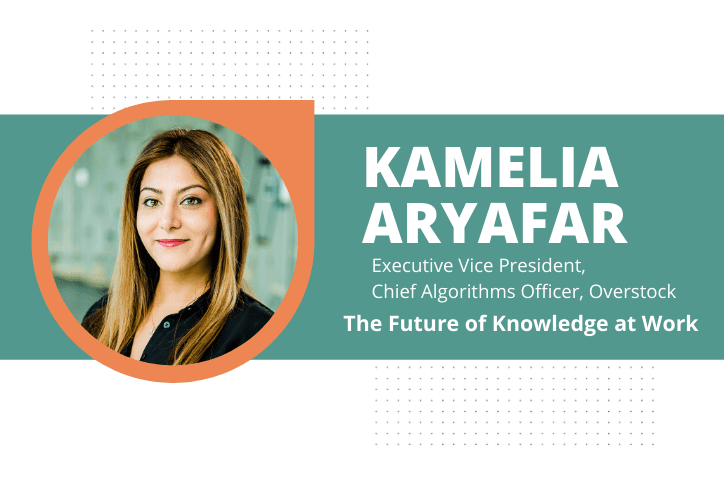Bloomfire Q&A: Overstock’s Kamelia Aryafar on AI, an Experiment-Driven Culture, and More

Artificial intelligence (AI) is opening up exciting opportunities to work with big data, learn more about consumers, and deliver an exceptional customer experience. But just investing in AI-powered technology isn’t enough. It takes a diverse mix of perspectives and people who work across different roles— including data science, engineering, and market research— to maximize the value of the information gleaned through AI-powered tools.
At Bloomfire, we’re always interested in learning how different organizations are using data and insights across different teams—and how they’re encouraging employees in different roles to collaborate around this information. We were thrilled when we had the opportunity to talk to Dr. Kamelia Aryafar of Overstock.com about how she and her teams are using AI, collaborating around data, and promoting an experiment-driven culture.
As Executive Vice President, Chief Algorithms Officer, and board member for Overstock.com, Dr. Aryafar leads the company’s data platform, technology, machine learning, data science, and analytics functions. From the algorithms that power Overstock.com’s search experience to the data strategy used to personalize the customer experience, she’s helping customers discover the most relevant products and information to meet their needs.
Check out our conversation with Dr. Aryafar below.
Tell us a little about yourself.
As an executive vice president and chief algorithms officer for Overstock.com, I strive to integrate an AI-first mindset throughout the entire organization, bridging the gap between engineering and science in business. I believe businesses should be swift and versatile when executing on AI technology, so I have focused on organizing highly diverse teams. Team members that come from various backgrounds and fields are able to come up with unique and innovative solutions to the most difficult problems. I’ve focused on establishing a solid foundation that would empower these teams to use their collective expertise, preferences, and skills to solve problems. I believe that a diverse team is a team built for success, and I look at every challenge as an opportunity to push the envelope.
How did you get started in your career in data science and analytics?
My passion for technology and computers started at a young age. By the time I was six years old, I learned my first programming language, Logo, and programmed a digital version of the game Hangman. This fascination with computer science was only amplified as I proceeded in my academic journey, earning a Ph.D. in computer science (machine learning) from Drexel University and started my career at Etsy as Senior Machine Learning and Data Science Lead.
What knowledge do you rely on most to do your job?
I’m a strong believer in surrounding yourself with the brightest talent, and I feel like we have some of the most talented scientists and engineers in the industry [at Overstock]. Part of our culture is a focus on collaboration, and I believe the greatest knowledge stems from individuals drawing on each other’s expertise. At a personal level, I rely on experimentation and proper testing to inform me and my teams of the best course of action to find solutions to complex problems.
In your experience working in technology and data science, what do you think are the biggest knowledge management challenges?
In the machine learning world, we need large quantities of training data. This can be a challenge when working with data silos across multiple platforms, which requires resources from ETL (extract, transform, load) and data warehouse teams. Another challenge arises with data quality and integrity, because it requires resources to clean and tag the data, so the models can perform with a reliable degree of accuracy. This is why we empower our engineers to employ modern solutions that allow us to access data in real-time, providing greater transparency for data integrity as well as the foundations to rapidly test, iterate, and scale.
How do you think new technologies (and especially machine learning) will impact knowledge management?
AI is ushering in a new era of technological innovation, paving the way for increased adoption across industries ranging from healthcare to autonomous driving to e-commerce. The novel capabilities offered by AI are empowering businesses to automate the different operations, making them faster and smarter, and enhancing overall productivity. One of the most significant benefits of AI is the management of massive datasets, which enables organizations to handle the flow of information efficiently.
In your role as Chief Algorithms Officer at Overstock.com, how do you ensure that stakeholders across your company are accessing and using data to make decisions?
As a leader, I want to ensure that our strategy aligns with our efforts to drive an experiment-driven culture. I reinforce the importance of establishing and standardizing best practices for experimentation across the company, including proper A/B testing and validation metrics. One way to accomplish this is to integrate data science throughout the business. Specifically, you can integrate data scientists into each area of your organization. In effect, you can ensure that all your strategic initiatives have a data science resource dedicated to them.
What’s one piece of advice you’d like to share with someone interested in pursuing a career in data and machine learning science?
My advice to budding professionals is to follow their passion as they have a myriad of resources at their disposal, including journals and coding courses. One does not need a doctorate to be a data scientist, but experience is only achievable through practice. As for moving up the leadership ladder, practitioners must make bold decisions and get involved in the community. It also pays to take part in cooperative projects and contribute to the academic community by publishing papers, attending conferences, giving talks, and supporting the cause. As a leader, it is vital to adapt and change according to the trends, while also focusing on the key areas that need improvement.
Thank you for sharing your insights, Dr. Aryafar!
Enjoyed reading this interview? Check out some of our other interviews with data and insights professionals.
Andria Long on Innovation as a Team Sport and Getting to Insights Faster
Steve Portigal on Reusable Research, Interview War Stories, and Letting Go of Implicit Beliefs

How to Build an Insights Engine: The People, Technology, and Culture You Need

How to Measure the ROI of Knowledge Management

How to Navigate the Chain of Command in Business to Get Executive Buy-in

Start working smarter with Bloomfire
See how Bloomfire helps companies find information, create insights, and maximize value of their most important knowledge.

Take a self guided Tour
See Bloomfire in action across several potential configurations. Imagine the potential of your team when they stop searching and start finding critical knowledge.